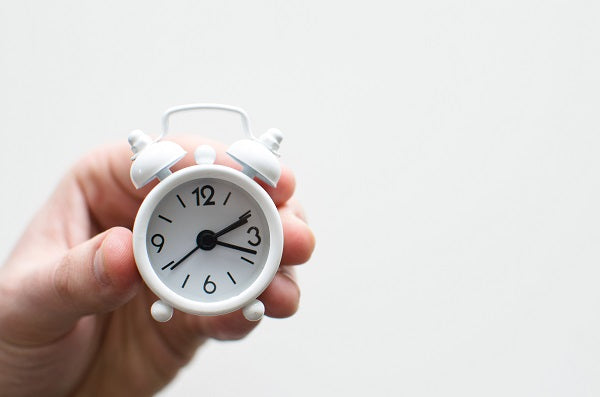
How Much Sex is Enough Sex?
There is no universal standard for acceptable sexual frequency, and nothing proves that point more acutely than being in a relationship where your sex drives aren’t exactly well-matched.
There are so many contributing factors to our overall senses of well-being, and that is intimately connected with our libidos. When we talk about differences in sex drive, we tend to focus exclusively on a lack of sex, without acknowledging how much the rest of your life matters, too. Even when you both want to have sex, life can get in the way—work, friends, family, chores, kids, whatever. That is not necessarily a bad (or a permanent) thing.
Whether you're the parner who wants it twice a day or the partner who wants it twice a week or month, we say that there is no magic number. Partners are having ‘enough’ sex when they both feel loved, respected and desired in their sexual relationship, regardless of the frequency. Read on for our thoughts on how to manage two very different sex drives...

Sometimes or all the time?
Start by asking yourself this question: Given the chance, how much sex would you actually want to have?
The answer may surprise you—not only because it can reveal exactly how important sex is to you, but because it can also put into perspective how important other things are in your life, too, and how much more you have in common with a partner than sex. You may find that despite a feeling of sexual frustration, you might not be quite as fixated as you thought you were on quantity, more on quality.
One trick: Make a list of everything in your life that you think prevents you from having enough sex. (For example: I’m too tired, they’re more interested in work, we have kids, someone has a headache.) One by one, run down that list. Is that thing more important than your intimacy as partners? Is there something you can do to change it?
If we’re honest, our sex drives are not fixed, on a constant plateau over time. We all have normal, healthy peaks and valleys that can and should be navigated with kindness. At the outset of any relationship, we tend to have more (and crazier) sex, and with time, it's totally natural for our libidos to level out.
Ask yourself this question—how often do you think about your own sex drive, compared with your partner's? Sometimes or all the time? If only sometimes, know that the feeling is normal, super common for couples, and something you can work on together. If all the time, that’s cause for more concern—there are differences, and then there are dealbreakers. Sex is not the most important thing in the world, but it does matter, and you should be honest with yourself and your partner.
Put yourself in your partner’s shoes.
Many believe there is no such thing as too much sex, especially those who wish they were having more of it. But for partners with a lower sex drive, especially one that’s natural and not a side effect of an illness or a medication, the pressure to submit to a partner who wants more sex can be uncomfortable. We all take it for granted that everyone wants sex, but really, nobody wants it 24/7—and some people just want less. While it hurts to be rejected, it doesn’t feel good to reject someone else, especially not a partner.
On the other hand, a partner who wants more sex and isn't getting it can feel sad, lonely, or depressed as a result, even if other aspects of the relationship are fulfulling. And if more sex is not a topic up for debate, those feelings of loneliness or resentment don't just go away. Pressuring your partner makes you both feel bad, but you're not sure where else to turn for relief.
A lower libido is not, in itself, a cause for anxiety or concern. If you find that you want more sex but just aren’t feeling it that often, there are medical solutions and self-care practices that can help you get into the mood. And if you have a higher one, there are ways to pay attention to each other that aren't necessarily sexual, and these can help both of you to feel more desired in the relationship. If you’re sexually frustrated and not able to have sex, and want to focus on that less, spending quality time with your partner without the expectation of sex is key.
If you're the partner with a higher sex drive, that doesn’t make you ‘oversexed’, and you aren’t a bad person for wanting to have more sex with your partner, even if it sometimes feels like you're forcing the issue. Wanting to feel desired by your partner is so, so normal! Unless an open relationship is an option, embrace the possibility of an intimate relationship with yourself as well as your partner, with or without toys, especially if the lack of physical intimacy isn't their choice. Masturbating is not the same as having sex, but having more than one outlet for your sexual satisfaction is healthy.
Bottom line—whether you have a higher or lower sex drive, there is nothing inherently wrong with you, or your partner.
Expand your horizons.
Let’s return for a sec on the point of sex being a dealbreaker in relationships.
So many people approach a difference in sex drive by saying, “Everything is perfect about my partner, except we don’t have enough sex," and that’s a very telling statement. Imagine yourself saying the opposite: “The sex is great, but my partner? Not so much.” Does that sound like a very fulfilling relationship?
Especially in longer-term relationships, and with other priorities on our plates, it can be easy both to take our partners for granted, and to think that sex will happen naturally, without us paying special attention. Like we said before, our overall senses of well-being contribute to our sex drives, and if we’re not relaxed and having fun with our partners, or there is resentment in the mix, sex does not necessarily ‘just happen’. If there is an obstacle in the way of your actually having sex, mutual masturbation can be an equally-intimate alternative. Trying a new toy, especially one that doesn't try to mimic the act of penetrative sex (like Sona) can help to get you in the mood and give you a fun new feeling to crave.
Whether you have a higher or lower sex drive in your relationship, you want to feel loved and appreciated by your partner, right? So why not spend more time having fun together, and trying new things? Taking walks, cooking or going out to eat, going to concerts, doing something exciting or crazy, or just hanging out together. Kissing without the expectation of sex is also amazing. Quality time is sexy in and of itself, because it means you're comfortable just being yourselves in front of each other. Sexy does not necessarily equal sexual.



